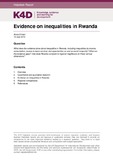Evidence on Inequalities in Rwanda
Abstract
This review identifies and reviews the evidence on inequalities in Rwanda. Undertaken in six days, it draws primarily on national Rwandan datasets and smaller-scale case studies from academic research. This study focuses primarily on quantitative datasets and sources, supplemented by some qualitative research. A related report by Carter (2018) which examines the relationship between inequality, exclusion and poverty in Rwanda, also provides insights from key qualitative studies.The body of evidence around inequality in Rwanda is mixed, both in terms of scope and coverage and quality. It is also characterised by competing narratives about whether or not inequality is declining or not (Behuria and Goodfellow 2016: 3). This reflects, in part, the inherently complex nature of inequality, how it is measured, and different approaches to gathering data. Key findings of the review include: there is limited body of disaggregated data on inequalities in Rwanda (Dawson 2018); commonly used standard indicators to measure poverty and inequality don’t always resonate with experiences of poverty and wellbeing of local communities (including women and historically marginalised people), particularly in rural areas (Dawson 2018); inequality measured by access to basic services such as health, education, water, sanitation and electricity shows improvements over the past two decades; enrolment in primary and secondary education has grown and gender gaps narrowed – in some cases, girls’ enrolment is higher than boys; inequalities in access to the labour market were also identified, with variation across contexts; and other factors that affect economic empowerment include distribution of land and financial assets. This study also identified evidence gap in the need for more detailed disaggregated data and for research that takes into account the heterogeneity of the Rwandan poor, in order to better understand rural poverty and inequality (Ansoms and McKay 2010).
Citation
Orrnert, A. (2018). Evidence on inequalities in Rwanda. K4D Helpdesk Report. Brighton, UK: Institute of Development StudiesIs part of series
K4D Helpdesk Report;356Rights holder
© DFID - Crown copyright 2018.Collections
- K4D [937]

